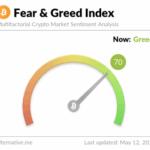
SEC Chair Atkins Emphasizes the Importance of Revising Crypto Regulations, Promises to Move Away from ‘Regulation by Enforcement’ Approach
The Chairman of the Securities and Exchange Commission, Paul Atkins, has called for a comprehensive update to the regulatory framework governing cryptocurrency assets in the United States. He proposed a three-part approach aimed at revamping the rules concerning the issuance, custody, and trading of these assets.
This announcement was made during his keynote speech at a recent roundtable organized by the SEC Crypto Task Force on May 12, which focused on the topic of tokenization and its implications for enhancing capital markets.
Atkins compared the transition to blockchain-based assets to the digital evolution in the music sector, suggesting that “on-chain” securities could transform capital markets in a manner similar to how MP3 technology changed music distribution.
Under Atkins’ leadership, the SEC’s foremost goal will be to establish a coherent regulatory framework specifically designed for the digital asset landscape, breaking free from an era of inconsistent enforcement that has stifled innovation.
He assured that future policymaking would rely on formal processes rather than ad-hoc measures, reinforcing his recent comments on the subject.
Atkins stated:
“Today marks a new era at the SEC.”
Comprehensive reform initiative
Atkins presented an ambitious reform initiative aimed at facilitating compliant crypto asset issuance, broadening the scope of legal custody options, and updating trading regulations.
He pointed out that only a few initiatives have managed to successfully navigate the traditional registration processes with the SEC, attributing the challenges to outdated disclosure requirements and legal ambiguities.
In response, the agency will explore the possibility of exemptions, safe harbors, and disclosure guidelines that are more appropriate for digital-native assets. He made it clear that interim staff guidance is not permanent and that formal rulemaking by the Commission is necessary to create lasting standards.
On the subject of custody, Atkins supported the repeal of Staff Accounting Bulletin No. 121, which had imposed stringent rules on the treatment of crypto assets. He called for greater clarity regarding what constitutes a “qualified custodian” and argued that custody regulations should evolve to account for self-custody methods and emerging best practices in the industry.
Regarding trading, he expressed his support for broker-dealers being able to provide integrated services that encompass both crypto and traditional assets through a unified platform. He also mentioned the potential for conditional exemptions to accommodate innovative products that may not currently conform to existing regulations.
Strengthening US dominance
In alignment with calls from President Donald Trump to position America as the “crypto capital of the world,” Atkins cautioned that failure to adapt by the SEC could result in innovation relocating to other countries.
He commended Commissioners Mark Uyeda and Hester Peirce for leading the newly created Crypto Task Force, which aims to dismantle internal barriers and accelerate guidance throughout the agency.
Throughout his address, Atkins stressed the importance of developing regulations that safeguard investors while promoting innovation. He mentioned that fraud enforcement will continue to be a priority, but the SEC’s strategy will revert to its foundational mission of monitoring for breaches of established obligations, rather than using enforcement actions as a means of policy formulation.
The SEC is anticipated to move forward with additional rulemaking efforts, staff guidance, and collaboration with other agencies in the upcoming months, as it aims to position the United States as a leader in the area of tokenized financial systems.



















Post Comment